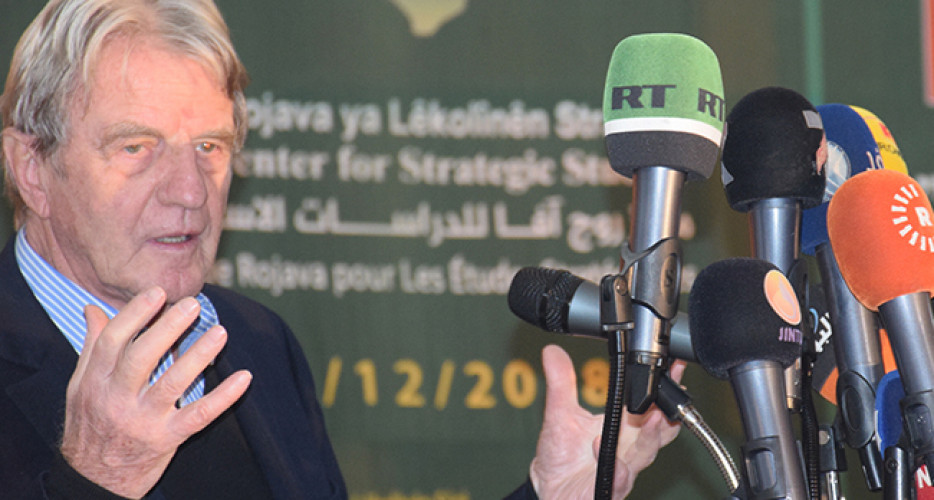
By Renwar Najim
The former foreign minister of France, Bernard Kouchner, said to work to confront and limit Turkish violence and demographic change in the Kurdish-populated areas in Syria.
To take part in the Genocide and Demographic Change in Afrin Forum in Amuda, Syria, Kouchner arrived at Qamishli, a Kurdish-controlled city in the northeast of Syria.
During the forum, Kouchner gave a speech, "We must confront Turkish violence and occupation," he added, "However, first we have to ask: why is there so much silence when Kurdish are treated like this?"
Focusing on peace, Kouchner said the duty is much more difficult than it seems, "You have to confront your enemy at the same time and discuss with them."
Many politicians, researchers and scholars took part from all around the world, where the situation in Afrin after the Turkish attack, and Turkey's policy in the area were discussed.
Kouchner promised to make "serious efforts" to limit Turkish actions, which ranges from murder and evacuation to demographic change against the people of Afrin.
Speaking to the people of Afrin, he said, "You are part of a grand game, as the Middle East faces such a scheme and many countries try to impose their influence in the region, including Russia, the US, Iran and Syria."
He said, "We repeat our promise: we'll always be with the people of Rojava [Syrian Kurdish-controlled areas]."
After the occupation of Afrin, Turkey has changed the names of many villages and areas of the canton, evacuated thousands of people, and replaced them with others.
Reports mention of ruining historical heritage in the area, which follows the Syrian regime's policy against the native people of these lands. 56 years ago, the Syrian regime started a policy of denial against the Kurdish identity of Jazira city and considered Kurdish residents as refugees. Turkey seems to repeat the same policy.
The memory of the law number 93 of 23 August 1962 in Syria is vivid for Kurds in Syria, which prompted a consensus to determine the identity of Jazira residents.
The census resulted in refusing to give the national identity of tens of thousands of Kurds, considering them to be Turkish refugees, "You've come to Syria from abroad," they were told.
Syrian regime seized the property and houses of these people, counting them as state property, and giving some of it to the Arabs brought from other areas of the country.
Not only that, but Kurds were also prevented to register any property under their own name later, and youths were not allowed to finish their studies in the Syrian universities.
After the law was implemented in Jazira, the Syrian regime attempted to repeat the experience in all Kurdish areas, with Afrin and Kobani, but the Kurds resisted.
Political analyst Hozan Afrini said families were brought from Aleppo, Raqqa, Der al-Zoor to Jazira after the law number 93 was issued, and even know people can see that they are not originally from the place.
Afrini said Turkey implements a similar policy, "What happens in Afrin is the same policy, but in another form, where Turkey wants to make the people of Afrin Turks."
.jpg)
This photo, taken on 18 March 2018, shows the looting of Afrin, Syria
Turkey has brought thousands of families from the other areas of Syria to Afrin as well and changed the names of villages and places in Afrin. The Turkish army, and its affiliated militias, some with extremist views, entered Afrin in March 2018, after an intensive air and ground strike on the city for two months, which caused 100 thousand people to flee.
As they entered Afrin, the jihadists, supported by Turkey, started looting the markets of the town, which made it into the spotlight in some media outlets around the world. The Human Rights Watch also confirmed such incidents at the time.